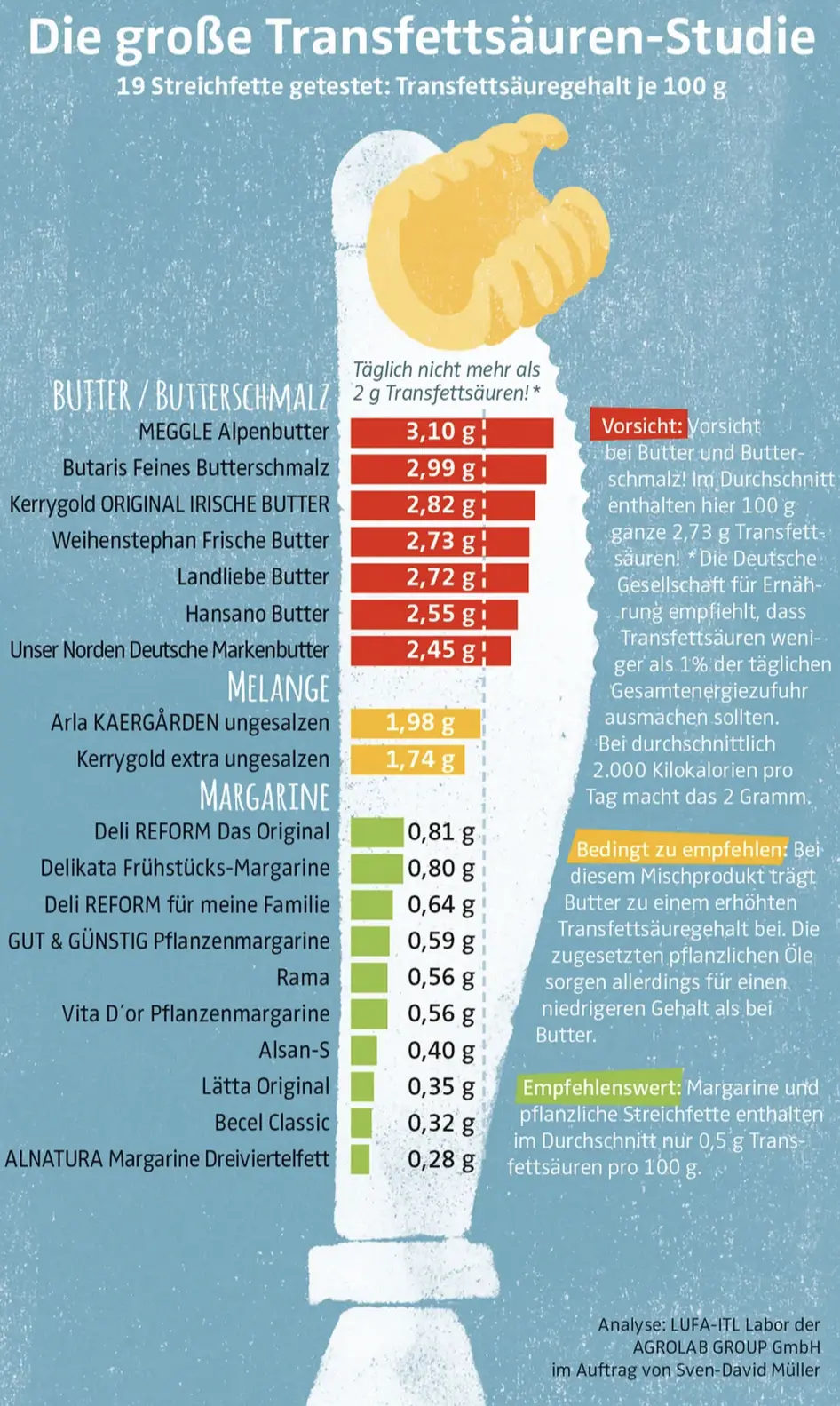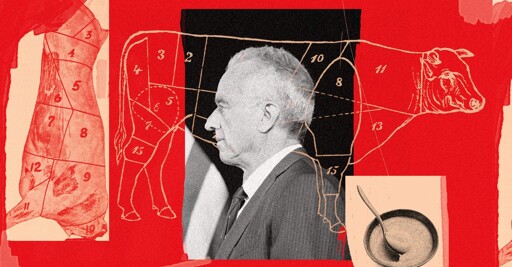there’s a few treats we still use lard or tallow for but that’s pretty much it, and only once-a-year at most.
still use real butter or bacon drippings for frying eggs, though. ain’t gonna give that up.
There’s also vegetable oil and margarine with butter flavor btw. that is way healthier.
I don’t know of any long-term studies that show that margarine in the US is healthier than butter.
Outside the US, margarine can contain trans fats, and those are far worse for you than any form of animal fat.
Hi, thanks for your answer.
Are you aware of a study that systematically compared margarine and butter in that regard? I searched on Google Scholar but wasn’t able to find any trustworthy bigger / international papers. Some small scale ones looking only at a handful of products in Pakistan but nothing that feels really reliable.
In Germany someone sent 19 popular margerine, butter and hybrid brands to a laboratory in 2015 to debunk the myth of trans fatty acids in margarine. Indeed, all plant-based products scored significantly better. Butter and ghee had 4 to 10 times higher amounts of trans fatty acids.
The author of this study (if you want to call it a study) wanted to proof exactly that. Therefore, I personally would take its outcome only with a grain of salt. But as I didn’t find any more trustworthy sources, I’d be glad to see yours.

It’s expensive AF, but duck fat is not saturated… And omfg is it good
https://foodstruct.com/compare/duck-fat-vs-lard
Duck fat is about 33% saturated fat. Lard is 39%.
So it’s less saturated, but a long way from not being saturated.
It is delicious, though.
Should have said not AS saturated
Less saturated, more fat / volume and higher levels of mono and poly which is good.
none of the fats are “unsaturated”
In terms of saturated per TBL, it’s kind of middle of the road, lower than lard and tallow and coconut, higher than canola, vegetable, avocado or chicken fat.
The omega 6/3 thing about seed oils mentioned in the article is real. It can be a big cause of inflammation. Plus, seed oils often have pretty toxic extraction procedures, especially for the cheap stuff.
But tallow and animal fats aren’t the solution. Olive oil is. And I guess avocado oil if you need something more neutral and/or with a higher smoke point.
Please share your proof of any negatives of seed oil, because it’s bullshit
- https://nutritionfacts.org/video/3-mcpd-in-refined-cooking-oils/
- https://nutritionfacts.org/video/the-carcinogen-glycidol-in-cooking-oils/
You can read the transcripts if you don’t want to watch the videos. Enjoy!
Yeah, that’s not a great source. https://mediabiasfactcheck.com/nutritionfacts-org/
Mostly because of his bias for veganism, which those linked videos have nothing to do with. But if you prefer more mainstream sources: https://www.theatlantic.com/health/archive/2012/04/how-vegetable-oils-replaced-animal-fats-in-the-american-diet/256155/
https://www.medicalnewstoday.com/articles/324844#vegetable-oil
The Atlantic article is about the marketing of shortening and hydrogenated vegetable oil. The authors are a psychiatrist and a writer for Oprah. It really says nothing about vegetable oils that don’t contain trans fats.
And most of the non-crank advice on light vegetable oils is just to avoid scorching them when cooking. Scorched oil, like any burnt foodstuff, contains free radicals that can be carcinogenic. One of the strongest pieces of science-based dietary advice is “don’t eat burnt stuff.”
And what of that last link?
It’s about the use of hexane as an extracting agent in food processing. Hexane’s nasty stuff that should go nowhere near the food chain, but the article has nothing to do with the subject of this thread.
I don’t know about avocado oil, but you’re not going to be able to solve America’s love of deep fried food with olive oil both due to the cost and due to the practicality.
Yeah, olive oil is not for deep frying. But maybe Americans shouldn’t be having quite as much fried food? (I say this as someone who just had fried food for dinner.)
I agree, but switching people to less unhealthy frying oil is easier than stopping them from eating so much fried food.
As I mentioned in another comment, today’s food economics are not written in stone. There are all sorts of tax and subsidy levers in the public policy toolbox. One reason, say, soybeans and soybean oil are so cheap in the U.S. today is farm subsidies.
But humans being drawn to fatty and sugary foods is written into our DNA. Unless you find some way to ban fried food, people are still going to eat it. A lot. You would need a massive cultural shift away from fatty and sugary foods and that would take more than taxes and subsidies because things like fried chicken and waffles are now considered part of someone’s culture.
It’s about frequency and quantity. Sure, people will always have a taste for unhealthy food. But until sugar/corn was massively subsidized in the U.S., people didn’t eat nearly as much sweet junk. It took a massive cultural shift to get to where we are today. Massive cultural shifts happen.
It sure would take a massive cultural shift for black people to give up a lot of soul food staples since, again, it’s a big part of their culture.
And I have no idea why you think less subsidies would make people who make soul food eat less fried food. They were eating fried food when they had to make it with pig fat and had no choice and they’re still making it now, often still with pig fat. Subsidies are not involved.
I think you need to do a little exploration into soul food and also how important it is. This is a lot bigger than just “we need to stop eating this stuff, it’s unhealthy.”
The reason being saturated fats are linked with poor health, and unsaturated fats are linked with better health. And not just in a “rich people are healthier” way, when companies switched, everyone got healthier.
But this guy doesn’t care. We’re really living in a post-truth world.
Yup. It’s well studied which is why when someone has a heart attack the recommendation is essentially eliminating all saturated and trans fat. (See the DASH diet).
Basically, if the fat is solid at room temp, it’s unhealthy.
How solid we talking 🤔 wondering about bacon grease
If you leave bacon grease in the pan to cool down it solidifies, so it’s a ‘bad’ source.
So your telling me I should be scooping out the contents that harden on top of the crock pot instead of letting them melt back into the pulled pork for flavor… Ugh. I’m lazy so I usually just want to put the pot in the fridge at night, then back on high when I get home, by the time everything else is done it’s basically back to boiling.
Tbf unless you eat pulled pork daily I don’t think it’ll be a problem.
It’s like that old saying … “Everything in moderation”.
I had to cut back on eggs. I have hens out back that I just let free roam but I hadnt been giving them away fast enough. So I hard boiled a couple dozen and was eating them throughout the day just as snacks to keep food costs low. After day twot I realized I needed to slow my intake. Just got to loop more people into my egg ring. Luckily people like free eggs right now.
Come spring I’ll just put a thing down by the road so people can grab them when they drive by, but I do worry kids might have a field day with that lol
How many was too many?
I’ve got birds and while they’ve slowed laying I’m still eating 3-4 eggs a day and can’t say I’ve noticed any ill effects
Isn’t that just a measure of the melting point of different fats? And emulsions really muddle that line.
it could only be considered post-truth if there was ever any attempt at truth in the first place. Epidemiology makes Astrology look like legitimate peer reviewed science.
Epidemiology is a real thing though. You can certainly track, for example, the link between smoking and lung cancer. Not everything is as clear as that, but epidemiology is quite important.





